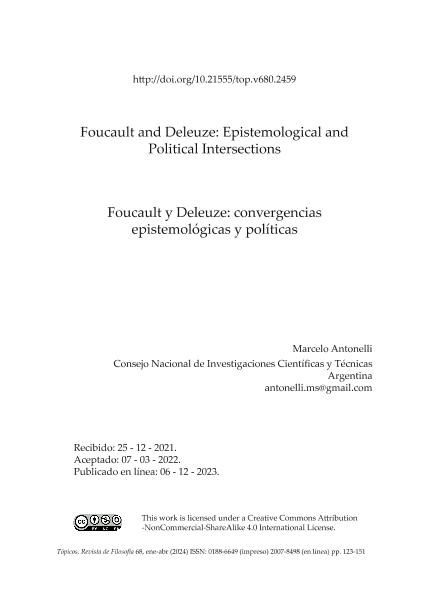Mostrar el registro sencillo del ítem
dc.contributor.author
Antonelli Marangi, Marcelo Sebastián

dc.date.available
2023-12-26T17:47:41Z
dc.date.issued
2023-12
dc.identifier.citation
Antonelli Marangi, Marcelo Sebastián; Foucault y Deleuze: Convergencias epistemológicas y políticas; Centros Culturales de México; Tópicos; 68; 12-2023; 123-151
dc.identifier.issn
0188-6649
dc.identifier.uri
http://hdl.handle.net/11336/221449
dc.description.abstract
El campo de debate que aborda el cruce entre Foucault y Deleuze oscila entre dos polos, según se resalten las convergencias o las divergencias entre estos autores: se los aproxima con tendencia a unificarlos, o bien se los aleja debido a desacuerdos inconciliables. En este trabajo sostenemos que, pese a indudables diferencias en sus recorridos de pensamiento, comparten posiciones filosóficas nodales, entre las que destacamos: rechazan los universales, proponen estudiar las multiplicidades, analizan el poder desde una perspectiva molecular, reformulan la función del intelectual y critican la representación política. Antes de fundamentar estos puntos de correspondencia, retomaremos el interrogante acerca de las razones para cruzar a Deleuze y a Foucault, dado no es una asociación arbitraria. También haremos algunas precisiones metodológicas con el ánimo de diferenciar nuestro abordaje de otros ya ensayados y argumentaremos en favor de las tesis comunes a ambos, específicamente en los ámbitos epistemológico y político.
dc.description.abstract
The debate on the crossroads between Foucault and Deleuze oscillates between two poles, depending on whether the convergences or divergences between these authors are highlighted: either they are brought closer together to unify them, or they are distanced from each other due to irreconcilable disagreements. In this article I argue that, despite undoubted differences in their philosophies, they share nodal philosophical positions, among which I highlight the following: they reject universals, propose to study multiplicities, analyze power from a “molecular” perspective, reformulate the role of the intellectual, and criticize political representation. Before substantiating these points of correspondence, I address the question of the reasons that led us to compare Deleuze and Foucault, given that it is not an arbitrary association. I also make some methodological clarifications in order to differentiate my approach from others already tested, and I argue in favor of the those shared theses, specifically in the epistemological and political fields.
dc.format
application/pdf
dc.language.iso
spa
dc.publisher
Centros Culturales de México
dc.rights
info:eu-repo/semantics/openAccess
dc.rights.uri
https://creativecommons.org/licenses/by-nc-sa/2.5/ar/
dc.subject
UNIVERSALES
dc.subject
INTELECTUAL
dc.subject
REPRESENTACION
dc.subject
MULTIPLICIDADES
dc.subject.classification
Filosofía, Historia y Filosofía de la Ciencia y la Tecnología

dc.subject.classification
Filosofía, Ética y Religión

dc.subject.classification
HUMANIDADES

dc.title
Foucault y Deleuze: Convergencias epistemológicas y políticas
dc.title
Foucault and Deleuze: Epistemological and Political Intersections
dc.type
info:eu-repo/semantics/article
dc.type
info:ar-repo/semantics/artículo
dc.type
info:eu-repo/semantics/publishedVersion
dc.date.updated
2023-12-26T13:50:46Z
dc.identifier.eissn
2007-8498
dc.journal.number
68
dc.journal.pagination
123-151
dc.journal.pais
México

dc.journal.ciudad
México, DF
dc.description.fil
Fil: Antonelli Marangi, Marcelo Sebastián. Universidad Pedagogica Nacional.; Argentina. Consejo Nacional de Investigaciones Científicas y Técnicas; Argentina
dc.journal.title
Tópicos
dc.relation.alternativeid
info:eu-repo/semantics/altIdentifier/url/https://revistas.up.edu.mx/topicos/article/view/2459
dc.relation.alternativeid
info:eu-repo/semantics/altIdentifier/doi/http://doi.org/10.21555/top.v680.2459
Archivos asociados
